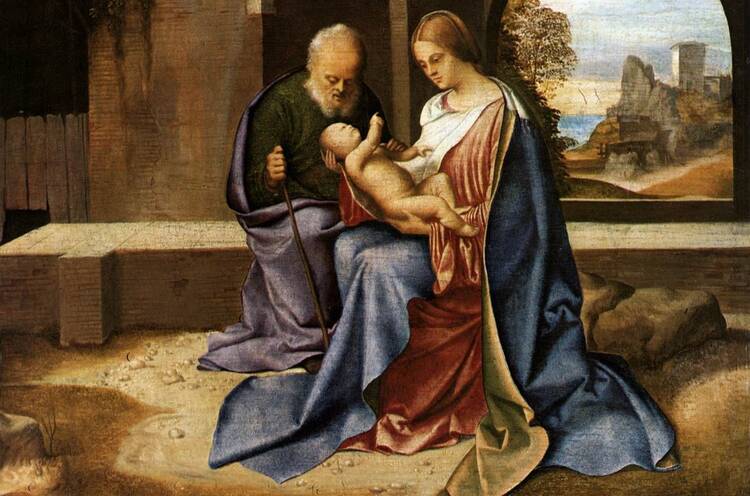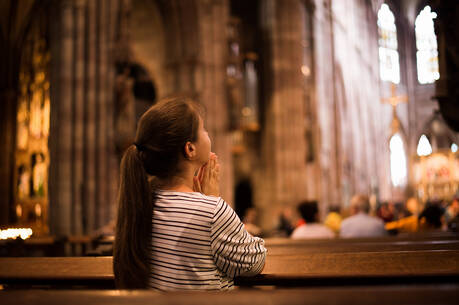A Homily for the Feast of the Holy Family
Sirach 3: 2-6, 12-14 Hebrews 11: 8, 11-12, 17-19 Luke 2: 22-40
No one can love us like family, and no one can hurt us like family.
We would have stood in the middle of the food chain, if the Good Lord had not endowed us with intelligence. The minds God gave us took us to the top, making us practically invincible among creatures, but God also gave us hearts, making us vulnerable in a way unknown to other creatures.
And so, a fundamental feature of our humanity is this: The more we open our hearts to love and the life that it gives—the more human we become—the more exposed we become. You can only be human by going out of yourself. The heart must lead, and, when things go wrong, it suffers the most grievous wound.
The nature of family love, like all love, is vulnerability.
We emerge from families, and most of us still seek to form them. Maybe, better to say, we are families because we never really exit from them. They are in our DNA, our mannerisms, our way of doing things. Ironically, even those who would reject their family of origin tend to do so in much the manner they were weaned.
I remember an undergraduate saying that she could not sit through a theology class because her small-minded parents had shoved religion into her. We were standing in a stairwell, and I had inquired when she would hand in her paper. I understood her reluctance to take the honors class, but I also sought to suggest gently that her current, closed stance to religion might also be seen, like that of her parents, as small-minded.
No one can love us like family, and no one can hurt us like family. The adage conforms to a constant of the spiritual life: Our blessings and our curses tend to be two sides of the same coin. What gives us strength carries risk, and conversely, our shame may spring from something longing to be good, something still finding its way.
Simeon
Was righteous and devout,
awaiting the consolation of Israel,
and the Holy Spirit was upon him (Lk 2: 25).
The new little holy family encounters the old man in the temple, when their Son is presented to the God of Israel.
Simeon blessed them and said to Mary his mother,
“Behold, this child is destined
for the fall and rise of many in Israel,
and to be a sign that will be contradicted
—and you yourself a sword will pierce—
so that the thoughts of many hearts may be revealed” (Lk 2: 34-35).
The Fathers of the Church, and subsequent Catholic piety, receive these words as a prophecy for Mary, foretelling her coming sorrows. Some scholars, who would downplay her role in salvation history, have suggested that the text is saying only that Mary, like every other soul who encounters this child, will be forced to decide for or against him. Still others suggest that as a faithful daughter of Israel, she will experience great pain in seeing her people divided over the question of their messiah. Though if that is all that is being said, if she is no more than one of countless souls, why single out Mary?
One exegesis does not necessarily cancel out the others. It is in the very nature of scripture to have many layers, various veins ready to be mined for meaning. But we should note that in this scene one soul, already wounded by love, is addressing another, who already loves so deeply.
Faith is a profoundly human act, because it is not a risk that the mind runs alone. Indeed, the heart must lead the way. Why? Because what the mind sees in the experience of faith is the offer of love, and so it is the heart that must decide whether to run the risk of accepting this love.
Simeon was a man of faith. He ran the risk, “awaiting the consolation of Israel” (Lk 2: 25). How many years did Simeon haunt the temple? Saint Luke tells us that “the Holy Spirit was upon him” but it is sometimes in the nature of the Spirit’s indwelling that the soul only sees outward, not the Spirit within. It gazes farther and more deeply into this fallen world of sin. Hence one can be filled with the Holy Spirit and still suffer a tremendous sadness, a melancholia of longing for God and distress over the fate of God’s creatures.
So, one broken but beating heart, one quietly gored but grace-filled soul, warns another that the price of great love is great pain. And who would love the Christ child more than she? How rightly the Fathers of the Church acclaimed her as a martyr for love!
The child does not intend to hurt her. Is that not so often how it is with families? We do not intend to hurt each other, but the vigor we draw from the family comes coupled with vulnerability.
Yet the child must be himself. Even strengthened by a family largely untouched by sin, he must nevertheless go forth from it. In the words of my favorite Marian hymn,
Sing of Jesus, son of Mary,
In the home at Nazareth.
Toil and labor cannot weary
Love enduring unto death.
Constant was the love he gave her,
Though he went forth from her side,
Forth to preach, and heal, and suffer,
Till on Calvary he died.
Small wonder that two souls suffer the torment of death at Calvary. The crucified Christ is the son of Joseph and Mary. The manner of love he has learned among them, the loving vulnerability of family, has brought him to this place of darkness and ever contagioned death.
Even if God has already called Joseph away, Mary remains at the foot of the cross. Her heart is nailed to it. Great love will not refuse to pay the exorbitant cost of great pain.
Both Christ’s parents are present at the cross because they are in him still. By the wondrous, mysterious grace of God, they have made the Son of God, in his human nature, who he is. Their tender love has readied the Lamb of Sacrifice.








